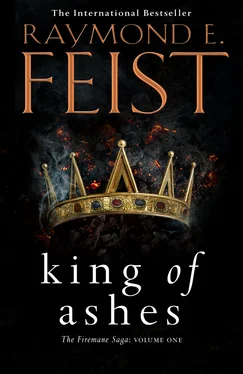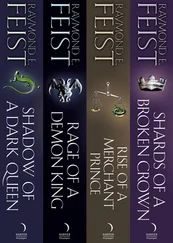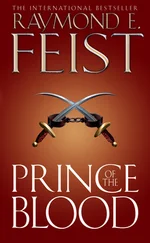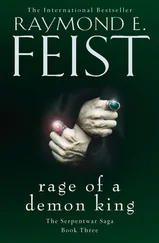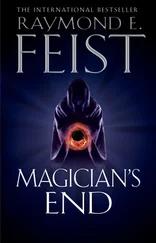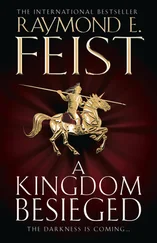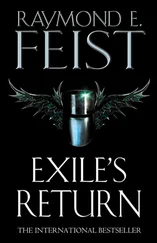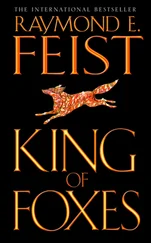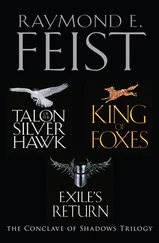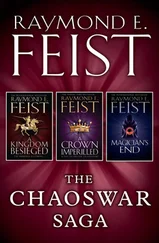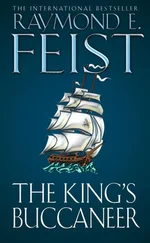Rodrigo shrugged. ‘Perhaps.’ He turned away again and left without further word.
Daylon lingered. ‘A baby,’ he muttered, amused for the first time in days. Tales of a surviving Firemane baby would prevent Lodavico from sleeping well for the rest of his days, even if the whispers were false. He briefly considered tossing coin to a rumour-monger to fuel such gossip. Nothing else in this evil business was worthy of mirth. He looked skywards, attempting to ignore the circling flocks of carrion eaters and enjoy what he could of the lowering sun and blue sky on the western horizon. ‘Well, at least the world didn’t end,’ he muttered to himself.
Of all of the nobles present, Daylon was among the very few who could be considered scholarly. He had studied the legends surrounding the oldest houses and knew of one myth in particular that predicted that a rampant chaos would be unleashed upon the world should the Firemane line end. Having witnessed no thundering hordes of demons racing towards the battlefield, Daylon moved towards his pavilion wondering if Steveren had indeed been the last of his line …
He passed by huge mounds of dead bodies awaiting burial. Exhausted soldiers laboured over the digging of mass graves, while priests of the One God said their prayers over the corpses. Daylon resisted an urge to curse in the name of the old gods; he had no desire to be denounced and burned at the stake.
Lost in thought, he barely realised he had reached his pavilion when he noticed two men standing quietly before the tent flap. Reinhardt, captain of Daylon’s household guard, wore the tabard of House Dumarch: a tough veteran, he had earned his position through years of loyal service.
The man next to him was also familiar to Daylon. He was a broad-shouldered, thick-bodied man, strong and keen-eyed, but one who had also started to show faint signs of ageing. His dark eyes were underlined with shadow and they possessed wrinkles at the edges that were evidence of a hard life. His brown hair was turning steel grey and was receding. His walk betrayed a stiffness in one hip, most likely the result of a wound taken in a fight years before. Covered in grime, soot, and dried blood, the man bowed slightly, barely more than a nod, but enough to satisfy Daylon’s need for deference.
‘Edvalt,’ said Daylon in greeting.
‘It is the day, my lord,’ said Edvalt.
Daylon released a tired sigh and said, ‘Must we do this now?’
‘It is the day, my lord,’ Edvalt repeated with emphasis.
‘Ten years? Has it really been ten years?’
‘At the noonday sun, ten years exactly,’ said Edvalt.
‘It’s midway to sundown; you tarried?’
Edvalt found nothing humorous in the remark. ‘I was busy staying alive at noon, my lord. King Steveren mounted a counter-attack on your rear: they overran the luggage and my smithy.’ He looked the ruler of Marquensas in the eye and asked, ‘Your pledge, my lord?’
Daylon bristled at the implication that he might not honour his pledge but reined in his urge to strike the man. He was angry and fatigued, and he also knew part of his frustration was caused by losing Edvalt’s services.
Captured in a border dispute, Edvalt had been spared the slave collar only because Daylon had noticed the quality of his enemy’s weapons. He had quickly identified Edvalt as the weapon-smith and offered him a choice: enslavement for life, or ten years of skilful service in exchange for his freedom. Daylon had gambled that the smith needed the promise of freedom to do his best work for his new master.
Daylon let out a long, measured breath and took control of his temper. ‘Yes, I remember.’
‘Ten years of faithful service in exchange for my freedom,’ said Edvalt, his tone even, his expression revealing a resolution Daylon knew all too well.
Daylon put his hand on Edvalt’s shoulder. ‘I know,’ he said with a tone of resignation. ‘It’s a bargain I regret,’ said the Baron of Marquensas. ‘Had I fully understood your gifts, I would have offered you your freedom that day in exchange for a pledge never to leave my service.’
‘Hardly freedom,’ said Edvalt.
Daylon was frustrated. He had hated every moment of this journey, and losing Edvalt to a promise made after another bloody confrontation was almost more than he could bear. ‘I need you, Edvalt, as certain as the rising sun at dawn. There’s more war coming, for Lodavico has turned the world upside down, and you are the finest smith I have ever known. And more, you’re a good man. Stay and I’ll make you wealthy.’
Edvalt paused for a moment, as if taken slightly off guard by Daylon’s request. He looked out over the field of carnage around them and said, ‘I thank you for the compliment, my lord, but my most fervent wish is that I never have to behold a sight such as this again.’ He looked Baron Dumarch in the eye and said, ‘It is time.’
Fatigue, frustration, and anger threatened to boil inside Daylon. He could simply ignore his pledge and keep Edvalt in service, but he knew that to do so would be to lose his skill forever. He waited a long moment, then finally let his better nature take control.
‘As of this moment, you’re a free man, Edvalt Tasman.’ He turned to Reinhardt. ‘Find a scribe and have him write a free passage for Edvalt—’
‘And for Mila,’ interrupted the smith.
‘Who?’ asked Daylon.
‘My woman, Mila.’
Daylon assumed he referred to one of the many camp followers, or a local girl from the city, but saw an opportunity. ‘Have you wed her without leave?’
Edvalt stiffened. As a bound man he should have sought permission to marry. He hesitated, then said, ‘Not before a priest. We pledged to each other. We have a daughter.’
‘Your woman is of no concern to me,’ said Daylon, ‘but your daughter is, by law, my property. She was born in bondage.’
The slight shift in Edvalt’s posture and expression were signs that both Daylon and Reinhardt recognised instantly. They showed that the smith was ready to fight with his bare hands against sword if need be.
Daylon mustered all the wisdom he had left and waved away Edvalt’s rising anger. He let out a long sigh and said, ‘I’ll not take your child from you, Edvalt. But in exchange you must give me your pledge.’
Edvalt’s eyes narrowed as he said, ‘To what end, my lord?’
‘I’ll answer that question in a moment, but first, where will you go?’
Without a moment’s hesitation, Edvalt said, ‘The Narrows. I’ll find a village in need of a smith and begin my new life in the Covenant lands. I can forge ploughshares, carve coulters, shoe horses and mules. If I must, I will repair a blade or forge a new one …’ He shrugged. ‘But should I never make another weapon, I’ll be content.’
Daylon weighed his answer. The finest weapon-smith he had ever known would not, at least, seek service with a rival lord. The Narrows was free of armed conflict, for the time being, so Edvalt would find little demand for weapons there.
‘Very well,’ said the Baron of Marquensas, ‘then we have no issue, but for the pledge: if you find an apprentice who trains to be your equal, you will send him to me.’
‘I’ll not put another in bondage,’ answered Edvalt.
Annoyed by the answer, Daylon snapped, ‘I would not take a freeman into service against his will. You were a captive in war, and it was my right to put you to death or sell you as a slave. I did neither.’ Both men knew his largesse was solely due to Edvalt’s talent, and not any generosity of spirit on Daylon’s part. ‘I will ask him to serve freely, and reward him greatly if he agrees.’
But the weapon-smith seized the moment. ‘Should I find such a lad, I will send him to you first,’ agreed Edvalt. ‘If he willingly takes your service, that is his choice, but should he wish to make his own way in the world, that is also his right?’
Читать дальше
